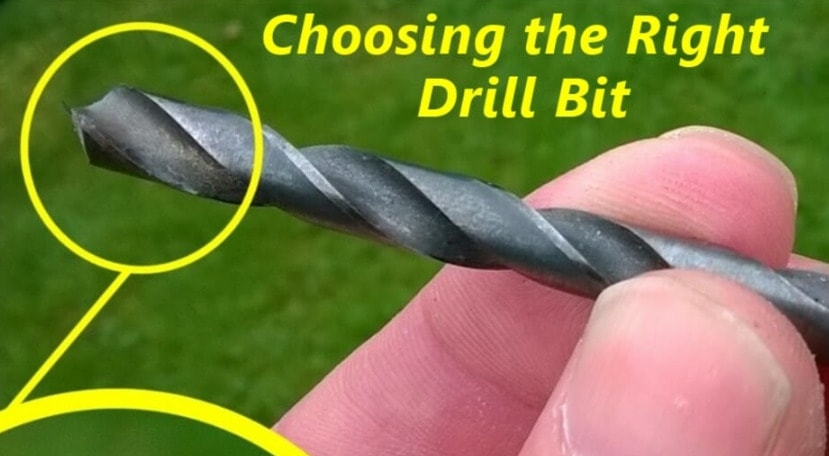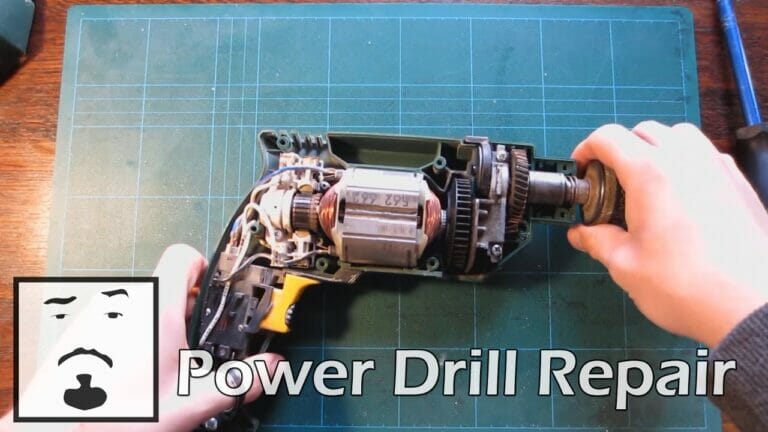
When it comes to masonry work, having the right drill bit can make all the difference in the world. But with so many options out there, how do you choose the one that’s best for your project? Well, you’re in luck, because today we’re going to explore exactly that!
In this article, we’ll walk you through the steps of selecting the perfect drill bit for your masonry work. We’ll cover everything from the different types of drill bits available to the factors you should consider before making a decision. So whether you’re a beginner or a seasoned DIY enthusiast, this guide has got you covered!
Ready to discover the secrets of choosing the right drill bit for your masonry work? Let’s dive right in and get started!
How to Choose the Right Drill Bit for Masonry Work?
When working with masonry, it’s crucial to choose the correct drill bit for the job. Here’s how to do it:
- Determine the type of material you’ll be drilling into.
- Consider the size of the hole you need.
- Choose the appropriate drill bit type, such as carbide-tipped or diamond-tipped.
- Check the compatibility of the drill bit with your drilling machine.
- Consider the cost and durability of the drill bit.
Remember to prioritize safety and accuracy when selecting your drill bit for masonry work.
Different Types of Drill Bits for Masonry Work
When it comes to drilling into masonry materials, not all drill bits are created equal. Various factors, such as the type of material you’re drilling into and the size of the hole you need, will influence the type of drill bit you should choose. Here are some of the most common types of drill bits for masonry work:
1. Masonry Drill Bits
Masonry drill bits, also known as carbide-tipped drill bits, are specifically designed for drilling into masonry materials. They feature a tough carbide tip that can withstand the hardness of materials like brick, concrete, and stone.
These drill bits come in various sizes and are available in both standard and long lengths. Masonry drill bits are suitable for general-purpose drilling in masonry, making them a versatile option for many projects.
When using a masonry drill bit, it’s important to apply steady pressure while drilling, allowing the tip to penetrate the material slowly. It’s recommended to use a hammer drill when working with masonry drill bits to provide the necessary impact and speed up the drilling process.
Benefits of Masonry Drill Bits:
- Designed for drilling into hard masonry materials
- Available in various sizes for different hole diameters
- Can be used for general-purpose drilling in masonry
2. Hammer Drill Bits
If you frequently work with tough masonry materials or require faster drilling speeds, hammer drill bits are an excellent choice. These bits feature a unique design with a flute-like spiral that allows for efficient material removal and rapid drilling.
Hammer drill bits are typically used with a hammer drill, a power tool that delivers a rapid hammering motion while rotating, providing increased impact and speed compared to standard drills.
Hammer drill bits come in various sizes and are available in both carbide-tipped and diamond-tipped configurations. The carbide-tipped hammer drill bits are suitable for drilling into softer masonry materials like brick and mortar, while the diamond-tipped ones are designed for drilling into harder materials like concrete and stone.
Benefits of Hammer Drill Bits:
- Designed for faster drilling speeds in masonry
- Efficient material removal for rapid drilling
- Available in carbide-tipped and diamond-tipped options
3. Tile Drill Bits
When working with tile or ceramic materials, a specialized drill bit called a tile or ceramic drill bit is required. These drill bits feature a spear-shaped carbide tip that reduces the chance of cracking or damaging the delicate tile surface.
Tile drill bits are typically used at slower speeds to prevent excessive heat buildup, which can lead to tile breakage.
When using a tile drill bit, it’s essential to apply gentle pressure and use water as a lubricant to keep the bit and the tile cool. Water not only reduces heat but also helps flush away the debris, allowing for a cleaner and more precise hole.
Benefits of Tile Drill Bits:
- Specially designed for drilling into tiles and ceramics
- Spear-shaped carbide tip reduces the chance of cracking
- Should be used at slower speeds with water as a lubricant
4. Spade Bits
Spade bits, also known as paddle bits, are primarily used for drilling large-diameter holes in wood but can also be used on softer masonry materials. These drill bits feature a flat, paddle-like tip with a point in the center and two cutting spurs on the sides.
Spade bits are often used in power drills or drill presses and provide fast and efficient drilling.
When using a spade bit for masonry work, it’s important to note that they are not designed for drilling into hard materials like concrete or stone. However, they can be suitable for basic drilling tasks in softer masonry materials like brick or mortar.
Benefits of Spade Bits:
- Designed for drilling large-diameter holes in wood
- Can be used for basic drilling tasks in softer masonry materials
- Provide fast and efficient drilling
5. Step Drill Bits
Step drill bits, also known as cone drill bits or step hogs, are unique drill bits that feature multiple stepped sizes on a single bit. These bits are particularly useful when drilling holes of different diameters in thin masonry materials, such as tiles or thin bricks.
Step drill bits work by gradually widening the hole with each step. This eliminates the need for multiple drill bits, making them convenient and efficient for various hole sizes. The sharp center point also aids in accurate positioning and prevents the bit from wandering off course during drilling.
Benefits of Step Drill Bits:
- Multiple stepped sizes on a single bit for drilling different hole diameters
- Great for thin masonry materials like tiles or thin bricks
- Eliminates the need for multiple drill bits
Frequently Asked Questions
When it comes to masonry work, choosing the right drill bit is crucial for achieving the desired results. To help you make an informed decision, we’ve compiled a list of frequently asked questions about selecting the right drill bit for masonry work.
1. What factors should I consider when choosing a drill bit for masonry work?
Several factors should influence your choice of drill bit for masonry work. First, consider the type of masonry you’ll be working with, such as concrete, brick, or stone. Different materials require different drill bits. Second, think about the size of the hole you need to drill. Ensure that the drill bit you choose is suitable for the diameter of the hole.
Lastly, consider the type of drill you’ll be using and ensure that the drill bit is compatible with it.
By considering these factors, you can choose a drill bit that is specifically designed for the type of masonry you’re working with, the size of the hole you need, and the drill you’ll be using. This will ensure optimal performance and efficiency when drilling into masonry.
2. What are the different types of drill bits available for masonry work?
There are several types of drill bits available for masonry work, each with its own unique features. The most common types include masonry bits, hammer drill bits, and carbide-tipped bits. Masonry bits are designed for general-purpose masonry drilling and are suitable for materials like concrete, brick, and stone.
Hammer drill bits are designed for use with a hammer drill and have a specialized tip for more efficient drilling into masonry. Carbide-tipped bits are highly durable and can handle the toughest masonry materials.
When choosing a drill bit, consider the specific requirements of your project, such as the material you’re drilling into and the depth of the hole. This will help you determine which type of drill bit is best suited for your needs.
3. How do I determine the size of drill bit I need for masonry work?
Determining the size of the drill bit you need for masonry work depends on the diameter of the hole you want to drill. Measure the diameter of the anchor or fastener you’ll be using and choose a drill bit that matches that size.
Keep in mind that you may need to choose a slightly larger drill bit if you want the anchor or fastener to fit loosely or if you’re drilling into soft or crumbly materials.
Another method for determining the size of the drill bit is by consulting a drill bit size chart, which provides a list of recommended drill bit sizes for different anchor or fastener sizes.
These charts can be found online or at your local hardware store and can be a handy reference when selecting the right drill bit size for masonry work.
4. Are there any safety precautions I should take when using drill bits for masonry work?
Yes, there are some important safety precautions to keep in mind when using drill bits for masonry work. Always wear safety goggles to protect your eyes from flying debris. It’s also recommended to wear a dust mask to prevent the inhalation of dust particles.
Additionally, use a steady and controlled grip when operating the drill to maintain control and prevent accidents. Lastly, ensure that you’re using the appropriate personal protective equipment (PPE) for the job, such as gloves and ear protection, if necessary.
By taking these safety precautions, you can significantly reduce the risk of injury and ensure a safe working environment when using drill bits for masonry work.
5. How can I extend the lifespan of my drill bits for masonry work?
To extend the lifespan of your drill bits for masonry work, proper care and maintenance are essential. After each use, clean the drill bit to remove any debris or residue. This can be done using a wire brush or compressed air.
Avoid exposing the drill bits to excessive heat or moisture, as this can cause damage. Store them in a dry place to prevent rust and maintain their condition.
Additionally, it’s important to use the right drilling technique to prevent overheating of the drill bits. Avoid applying excessive pressure or forcing the drill bit through the masonry material. Instead, use a slow and steady drilling motion, allowing the drill bit to do the work.
This will help prevent unnecessary wear and tear, maximizing the lifespan of your drill bits for masonry work.
Choosing the right drill bit for masonry work is important for successful drilling. Masonry bits are specifically designed for drilling into materials like brick, concrete, and stone. When selecting a drill bit, consider the material you are drilling into, the size of the hole you need, and the type of drill you are using.
There are different types of masonry bits, including carbide-tipped bits, diamond-tipped bits, and percussion masonry bits. Carbide-tipped bits are great for drilling into softer materials like brick, while diamond-tipped bits are more suitable for hard materials like concrete.
Percussion masonry bits work well with hammer drills. Always remember to use the correct size and type of drill bit to ensure efficient and accurate drilling.

